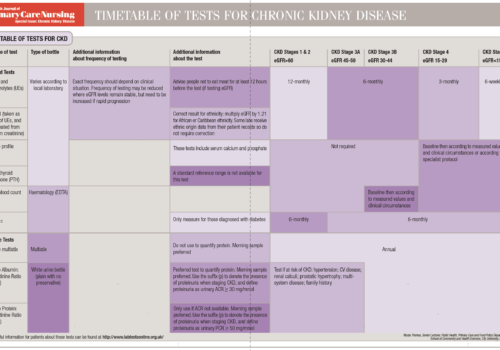Organ transplants can save or dramatically improve lives, yet figures for 11 February 2009 showed there were 7,903 people in the UK still on waiting lists for transplants, with the majority waiting for a kidney transplant. Last year, more than 400 people died while on the transplant waiting list.
Back to Basics: Timetable of tests for chronic kidney disease
Editorial
Chronic kidney disease (CKD) has moved rapidly up the healthcare agenda over the last few years. It has shifted from being considered as a rather nebulous condition of interest mainly to nephrologists to the front line of chronic disease detection and prevention in primary care as part of integrated management of vascular risk. In fact, the links between cardiovascular disease, kidney disease and diabetes are so close that CKD could also stand for ‘cardiovascular, kidney, diabetes.’
Editorial
Feel the fear and do it anyway.’ That could be the message of this special issue of the British Journal of Primary Care Nursing focusing on chronic kidney disease (CKD). Kidneys can be really confusing for practice nurses, with lots of technical sounding tests and numbers. But the good news is that the step-by-step guides and clear articles in this issue will help you get to grips with this important condition and feel empowered to make a real difference to the health and wellbeing of your patients.
Monitoring Chronic Kidney Disease Practice
The NICE guideline for chronic kidney disease (CKD) was introduced in 2008, with the aim of assisting practitioners both in primary and secondary care in the early identification and management of patients with evidence of kidney disease. However, some debate still exists surrounding the implementation of this guideline in everyday clinical practice. In this article, we sort out
Anticoagulation in Practice: Why it Matters that the Dose of Warfarin is Spot On
More and more nurses in primary care are involved in monitoring international normalised ratio (INR) levels and advising patients on warfarin doses as anticoagulation clinics move out of secondary care and into primary care. In this article we explore why warfarin is prescribed, how to monitor patients on the drug and what to look out for in terms of interactions with prescribed medicines, over-the-counter drugs and foods. We also need to be able to advise on lifestyle interventions that go hand-in-hand with taking warfarin.
Postural Hypotension
As we aim for tighter and tighter blood pressure control to minimise the cardiovascular complications of diabetes,the risk of postural hypotension increases. In this article we discuss what postural hypotension is and how to identify it and confirm diagnosis. We also consider the main causes and the relationship between diabetic neuropathy and postural hypotension as well as prevention and treatment strategies.
Editorial
This spring is an important time for the prevention and management of cardiovascular disease in the UK. The new vascular risk assessment and management programme, now known as the NHS Health Check, starts in April. And it’s the fifth birthday of the British Journal of Primary Care Nursing! So close your eyes and make a wish, and we hope we can play some part in making it come true.
Impaired Glucose Tolerance: What it is and How to Manage it
The new national strategy for vascular risk assessment, now being referred to as NHS Health Check, will include testing for diabetes and impaired glucose tolerance (IGT). This follows a major evaluation of the evidence showing that it is more cost-effective to screen individuals for IGT than screening for diabetes alone, but only as part of the broader vascular risk assessment. This article examines the concepts of IGT and impaired fasting glucose (IFG) and offers practical advice as to how these conditions can be managed in primary care.
You have been Diagnosed with Impaired Glucose Regulation
Understanding the Potential of New Oral Anticoagulant Drugs
Although there are other oral anticoagulation agents available, warfarin is the drug used predominantly in the UK. Warfarin has been in clinical use for over 50 years. It is still referred to by patients as ‘rat poison’ and,indeed, warfarin derivatives are still used as rodenticides.In this article, we take a look at some of the new oral anticoagulants coming along.
The Renal Social Worker: an Essential Team Member for Good Renal Care?
Renal services do not need renal social workers to keep patients alive.Nephrologists, transplant surgeons and renal nurses can manage that challenge without our involvement. So why are social workers attached to a renal service? Are they just an added extra – an upgrade in the service rather than an essential component of it?





















